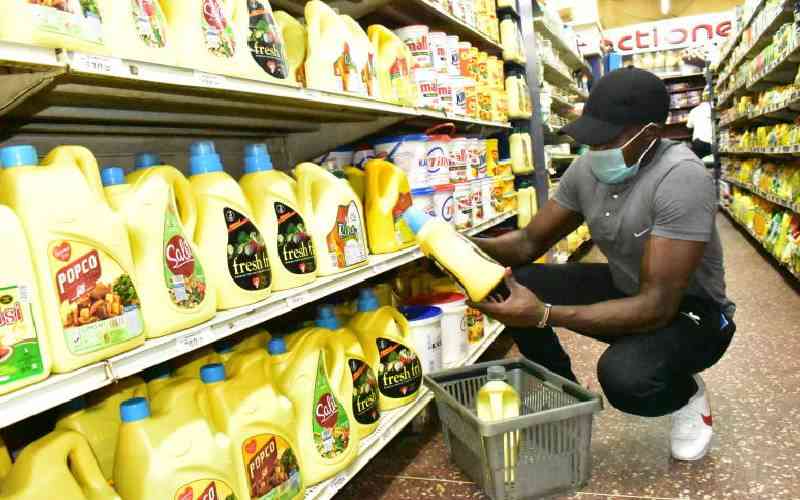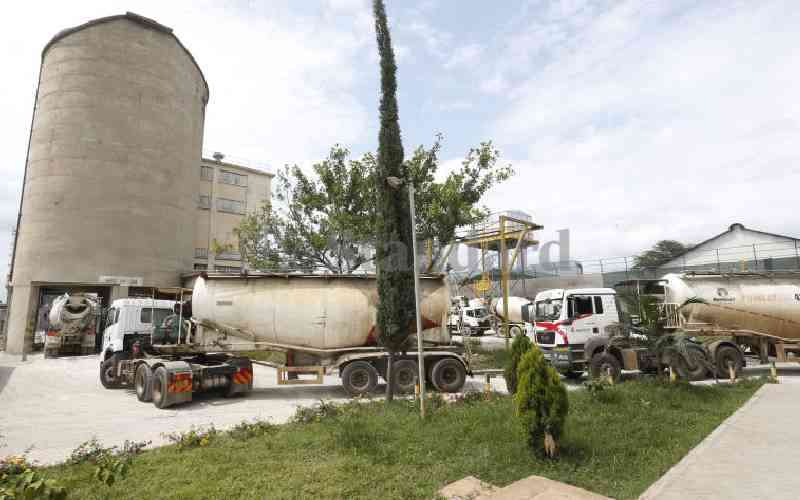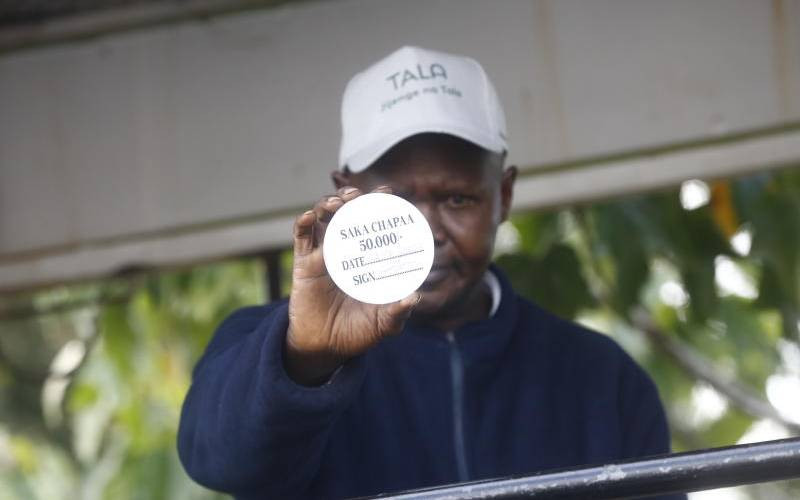
A plan to lower the cost of cooking oil is degenerating into a fight pitting the government against manufacturers.
In the plan, the government will import about 150,000 tonnes of cooking oil, which will flood the market with expectations of lowering prices.
A litre of cooking oil is retailing at about Sh330 which, although a reduction in recent months, is still beyond the reach of many.
Manufacturers in the edible oils sub-sector, however, say the government's plan would be detrimental to the local industry.
They warn that the imports would put at risk the thousands of jobs created by the industry, and hundreds of thousands of indirect jobs.
The Kenya Association of Manufacturers (KAM) expressed concerns that the imports, which will be exempt from the 35 per cent import duty that refined edible oils attract, could be significantly lower prices and possibly trigger a price war. Worse, it might force local edible oils makers to sell at below cost, which would spell doom for the industry.
"KAM's attention has been drawn by the traders' alleged importation of finished edible oil, at a preferential import duty regime for further bulk breaking into the retail market in Kenya," said KAM Chief Executive Anthony Mwangi in a January 23 letter to the Trade and Industry Cabinet Secretary.
"On behalf of our processing industry members, these allegations are of grave concern to the local manufacturing fraternity if confirmed to be true." Mwangi said according to the EAC Common External Tariff (EAC-CET) regime, imported finished edible oil attracts a 35 per cent import duty to encourage and promote local processing. "It will have negative implications for the local edible oil manufacturing industry."
KAM said the 150,000 tonnes import is against local demand of 650,000 tonnes annually, putting the 'mystery' importer in a position to have a bigger share of the Kenyan market than most of the 13 manufacturers of edible oil.
The manufacturers go on to say that the move is a significant departure from the Buy Kenya Build Kenya policy that aims to nurture local industries. It is also a negation of government's plan to increase the sector's contribution to the gross domestic product (GDP) to 20 per cent from the current seven per cent.
Responding to the manufacturers, Investment, Trade and Industry Cabinet Secretary Moses Kuria confirmed the incoming cargo, but clarified that the importer is the State-owned Kenya National Trading Corporation (KNTC).
Finished products
He added that the manufacturers had forced the government's hand by sustaining high cooking oil prices that are partly to blame for the high cost of living.
The CS went on to cast doubt about the existence of a local edible oils industry, claiming that the companies import finished products and the much they do locally is repackage the cooking oil. "Let's start here, who is the local industry? Who are they? Name the companies," Kuria told Sunday Standard in response to a query on the matter.
He said the firms have not been manufacturing but instead import refined edible oil, repackage it and push it to retail outlets.
"All this while they benefit from duty-free imports because they pass the oil that they import as crude palm oil, but in reality they have been importing refined edible oil which should be attracting import duty," he said.
"In all these years, how come they have not supported a single farmer if they are truly manufacturing locally as they claim to be doing?" He swore to break a cartel-like circle of five firms that he claims dominate the industry and always have a say on what direction retail prices take.
He added that the industry had pushed Kenyans to a corner with the unjustified high costs of cooking oil.
"They need to know that the government has options," the CS said.
The edible oils industry, according to data by KAM, employs 10,000 people directly and another 200,000 indirectly.
The manufacturing sector's contribution to GDP last year stood at 7.2 per cent in 2021, according to the latest data by Kenya National Bureau of Statistics (KNBS), having registered a decade-long decline from about 12 per cent in 2011.
KAM said in the letter that the government would suffer tax revenue losses through the imports.
"The alleged importation of the finished edible oil at a preferential duty regime risks tens of thousands of jobs, government revenues, and potential investment opportunities," the CEO said. "Further, this would also have a negative signalling effect on the entire local manufacturing industry which contributes 18 per cent of total tax revenues for the government annually."
Oil imports
The edible oils sub-sector, according to KAM, paid Sh40 billion to government through taxes such as Railway Development Levy (RDL), Import Declaration Fee (IDF), Nuts and Oil Crops Directorate levy and value added tax.
"The industry also pays corporate tax, Pay As You Earn and other ancillary taxes," Mwangi said.
Kuria said the ministry had allowed KNTC to import in a process that was approved by the Cabinet last November.
The edible oil imports are expected to arrive in the next one week and bring down the cost of cooking oil by between 20 and 30 per cent.
"I have not opened this up to everyone but only to KNTC. The corporation has the know-how since they have been doing this since 1965...it its part of its mandate," Kuria said.
"When we announced the plans towards end of last year, there was a drop in the cost of cooking oil.
"We expected that once KNTC has imported and started distribution across the country, the retail price of cooking oil could come down by another 20 to 30 per cent." Earlier on Friday, Kuria said on his Twitter handle said the government would support the local industry to grow, including integration that would see farmers play a leading role in production of crude palm oil.
"The government is committed to establishing a vertically integrated edible oils industry starting from supporting farmers to grow palm oil in the Coast to value addition at the Dongo Kundu Special Economic Zone," said the CS.
He said importing edible oil in containers and repackaging the same in 20-litre jerrycans does not meet the threshold of value addition and manufacturing.
"Until such a time when we will have a fully vertically integrated edible oils industry, the government will continue taking measures to protect consumers from powerful cartels that continue to fix high retail prices and raising the cost of living," Kuria said.
"To these cartels and their hirelings I have this to say, in the previous ministers you found your match. In me you will meet your Waterloo. Don't try me."
The industry proposes another route to lowering the cost of cooking oil but one that would see the government take a hair cut in taxes that apply in the process of producing cooking oil. KAM has proposed the removal of the two per cent Nuts and Oil Crops Directorate levy, which would result to a reduction of Sh50 per 20-litre jerrican.
It also wants the government to do away with RDL and IDF on crude palm oil imports that will save Sh72 per 20-litre jerrican as well as other charges including VAT that adds Sh530 per 20-litre jerrican.
"By answering our prayers, the end consumer will save Sh667 per 20-litre jerrican, to retail at Sh4,141 down from Sh4,808," said KAM in a separate petition to the government.
 The Standard Group Plc is a multi-media organization with investments in media platforms spanning newspaper print
operations, television, radio broadcasting, digital and online services. The Standard Group is recognized as a
leading multi-media house in Kenya with a key influence in matters of national and international interest.
The Standard Group Plc is a multi-media organization with investments in media platforms spanning newspaper print
operations, television, radio broadcasting, digital and online services. The Standard Group is recognized as a
leading multi-media house in Kenya with a key influence in matters of national and international interest.











